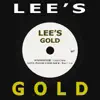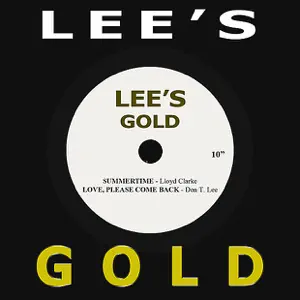


Acerca de Lloyd Clarke
With his warm tenor and expressive delivery, Lloyd Clarke was a born singer, although he was to find little financial reward for his efforts. Cutting his first song in 1960, Clarke released a string of singles over the course of the decade, still much sought after by fans and collectors. With no album to his name, however, the singer's name and fame have diminished over the years, barely helped by the paucity of his numbers that have been scattered across compilations. Clarke was born in 1937, in Linstead Saint Catherine, Jamaica; however, his family moved to the Trench Town neighborhood of Kingston while he was still an infant. As a child, he sang in the local church, and impressed both teachers and fellow students at high-school performances. Like many of the island's talents, the youngster also found success on the talent circuit, winning top place on the prominent Opportunity Hour show several times during the late '50s.
In 1960, Duke Reid brought Clarke into the studio for the first time, where he recorded "Parapinto Boogie," an instant sound system smash and a popular single on both sides of the Atlantic -- Blue Beat picked it for release that same year. For whatever reason, that appears to have been the only number the singer cut for Reid and, even odder, the singer never recorded with Coxsone Dodd, but he happily worked with many other foundation producers. In 1961, Clarke recorded with Prince Buster and cut a clutch of singles for Lloyd Daley, including the hit "Girls Rush," and several more for Charlie Moo, 1963's hit "Japanese Girl" among them. More producers beckoned in 1962, including Simeon L. Smith, who oversaw two more hits ("Good Morning" and "You're a Cheat"), and Leslie Kong, who produced the wildly popular "Love You the Most." Clarke also unleashed several popular duets, including 1961's "Now I Know the Reason" with Yvonne Harrison and 1962's "Love and Leave Me" and "Mow Sen Wa" with Derrick Morgan.
In 1963, the singer joined the King Edwards stable, recording a string of singles for the label, with "Fellow Jamaican" arguably the biggest of the batch. As the sun set on the ska age, Clarke recorded a clutch of boogie-fied 45s for pianist Theo Beckford, including "Love Me or Leave Me" and "Parro Saw the Light." With rocksteady in full swing, the singer next linked up with Bunny Lee, who oversaw an inspired version of the Gershwin classic "Summertime," another popular single. He cut "Young Love" for Enos McLeod in 1968 (the singing producer's first hit), and released a handful of further 45s in the early '70s, including "Chicken Thief." Later in the decade, Clarke re-recorded "Young Love" for Lloyd Campbell, but little else emerged, with the singer supporting himself through an array of jobs including bus driver and security guard.
Fans were surprised, then, when Clarke was next spotted in the British reggae band Jah Warriors. The group formed in Ipswich in the late '70s, with their album, 1984's No Illusions, featuring Clarke not just on vocals, but on saxophone. Who knew! When the band eventually folded, the artist faded from view again, only to reappear in 2007 as a member of URB (United Reggae Band). Formed by several ex-Warriors that same year to celebrate African History Month, URB found the climate welcoming and have stuck around performing live ever since. Clarke never found international fame and fortune, but his love of music has endured, and is evident in every song he's ever sung. ~ Jo-Ann Greene
In 1960, Duke Reid brought Clarke into the studio for the first time, where he recorded "Parapinto Boogie," an instant sound system smash and a popular single on both sides of the Atlantic -- Blue Beat picked it for release that same year. For whatever reason, that appears to have been the only number the singer cut for Reid and, even odder, the singer never recorded with Coxsone Dodd, but he happily worked with many other foundation producers. In 1961, Clarke recorded with Prince Buster and cut a clutch of singles for Lloyd Daley, including the hit "Girls Rush," and several more for Charlie Moo, 1963's hit "Japanese Girl" among them. More producers beckoned in 1962, including Simeon L. Smith, who oversaw two more hits ("Good Morning" and "You're a Cheat"), and Leslie Kong, who produced the wildly popular "Love You the Most." Clarke also unleashed several popular duets, including 1961's "Now I Know the Reason" with Yvonne Harrison and 1962's "Love and Leave Me" and "Mow Sen Wa" with Derrick Morgan.
In 1963, the singer joined the King Edwards stable, recording a string of singles for the label, with "Fellow Jamaican" arguably the biggest of the batch. As the sun set on the ska age, Clarke recorded a clutch of boogie-fied 45s for pianist Theo Beckford, including "Love Me or Leave Me" and "Parro Saw the Light." With rocksteady in full swing, the singer next linked up with Bunny Lee, who oversaw an inspired version of the Gershwin classic "Summertime," another popular single. He cut "Young Love" for Enos McLeod in 1968 (the singing producer's first hit), and released a handful of further 45s in the early '70s, including "Chicken Thief." Later in the decade, Clarke re-recorded "Young Love" for Lloyd Campbell, but little else emerged, with the singer supporting himself through an array of jobs including bus driver and security guard.
Fans were surprised, then, when Clarke was next spotted in the British reggae band Jah Warriors. The group formed in Ipswich in the late '70s, with their album, 1984's No Illusions, featuring Clarke not just on vocals, but on saxophone. Who knew! When the band eventually folded, the artist faded from view again, only to reappear in 2007 as a member of URB (United Reggae Band). Formed by several ex-Warriors that same year to celebrate African History Month, URB found the climate welcoming and have stuck around performing live ever since. Clarke never found international fame and fortune, but his love of music has endured, and is evident in every song he's ever sung. ~ Jo-Ann Greene
Nosotros
Notas
